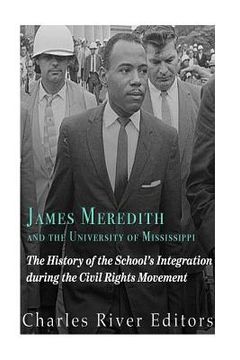James Meredith and the University of Mississippi: The History of the School's Integration During the Civil Rights Movement (en Inglés)
Reseña del libro "James Meredith and the University of Mississippi: The History of the School's Integration During the Civil Rights Movement (en Inglés)"
*Includes pictures *Includes contemporary accounts of the integration, including Meredith's own *Includes online resources and a bibliography for further reading *Includes a table of contents Though Thomas Jefferson in the Declaration of Independence wrote that the United States would be founded on the principles that all men were created equal, nearly 200 years would pass before the principle was put into any real practice. Although the end of the Civil War opened the door for the passage of the Civil War Amendments, which abolished slavery, and, in theory, granted the descendants of both free and enslaved blacks the same rights as those enjoyed by whites, those rights were not respected or practiced during the century following the war. Most aspects of life, including schooling, remained segregated on every level, especially throughout the Jim Crow South, and the years following the desegregation triumph of Brown v. Board of the Education in 1954 saw little done to accomplish the instructions given by the Supreme Court, especially at the university level. Enter James Meredith, a young man of 28 who decided to make it his life's mission to change that situation. In doing so, he took aim at the very heart of Southern segregation: the University of Mississippi. He might have chosen any school, but Meredith had a special interest in Mississippi, as it was his native state; he had grown up near his hometown's current mayor and likely had something of a personal score to settle, as well as a political one. He applied to the university in 1961 not only to get an education but to give one in an effort to teach the white people of Mississippi and the nation that they could no longer exclude their black neighbors from their lives. Of course, he also aimed to empower black citizens and demonstrate that they were indeed citizens with the same rights and responsibilities as anyone else. For his own part, Meredith seemed to feel a great responsibility than that he placed on others, for he insisted that he would willingly die for the cause of integrating American society. Indeed, having served most of his adult life in the United States military, he saw himself as a soldier, equal in heart and task to the many others who had gone before him. He would later admit that he was often surprised he had survived his battle, but he was always certain he would triumph, because while death was always an option, failure never was. Meredith is still remembered for the almost surreal scenes that came with his admission to the school, but those historic moments required a prolonged fight. After a drawn out lawsuit that involved the State of Mississippi appealing the lower court's decision, he was finally set to attend the university in September 1962, only to be repeatedly prevented by a mob, which included Mississippi Governor Ross Barnett. Governor Barnett had earlier attempted to stop Meredith's admission by changing state laws to ban anyone who had been convicted of a state crime; Meredith's "crime" had been false voter registration. An avowed segregationist, Barnett asserted, "The Good Lord was the original segregationist. He put the black man in Africa. ...He made us white because he wanted us white, and He intended that we should stay that way." And according to Barnett, the reason so many blacks lived in Mississippi at the time was because "they love our way of life here, and that way is segregation." Barnett would later be fined $10,000 and sentenced to jail for contempt (though he never ended up going to jail or paying the fine). On September 30, Meredith was escorted by U.S. Marshals sent in by Attorney General Robert Kennedy. A white mob attacked the Marshals, and nearly 200 people were injured. President John F. Kennedy finally had to send in the Army to allow Meredith to stay at school, and Meredith would receive a bachelor's degree in political science in August 1963.

